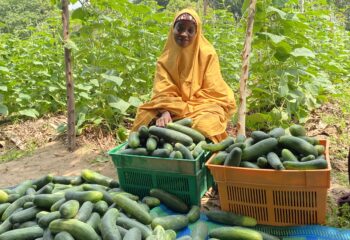
In its vision of contributing to the improvement of food and nutrition security in Benin, the Local Government Approach to the Agricultural Market in Benin – Phase 2 (ACMA2) project, has set the overall objective of increasing the incomes of agricultural economic actors in the region through access to the market. To facilitate access to the market, one of the supports provided by ACMA2 to the actors of the Agricultural Business Clusters (ABCs) is participation in trade fairs. Those who attended the 2019 Independence Fair of Benin (FIB) speak highly of the opportunity.

Dahlia Fleur Amonso is a soy processor. She is from Savè, Collines, in the central part of Benin. She got engaged in business by real passion. After she graduated from high school with a focus in commerce, she seized the opportunity to get professionally trained in entrepreneurship at Songhai Center. With support from ACMA2, she was able to attend the annual fair to showcase her products. After the fair, she said she sold more than she could have ever expected. She brought 20 kg of soya flour for porridge, 66 liters of soy milk, and about 50 kg of soya cookies.
“I sold all my products before the end of my participation period,” she said. Additionally, the fair provided an opportunity for her to network. “I’ve made a lot of business contacts, especially from some potential big customers who bought some of my products to test before being ready to order a large quantity. I’m grateful for this opportunity I got via the ACMA2 program.”

Pauline Banboche processes palm nuts into palm oil. Since childhood, she has assisted her parents, especially her mother, with palm oil production. The memory of her mother, who has since passed on, and her desire to honor her family fuels her passion. Ever desiring to improve her product and processes, she connected with the ACMA2 program.
“Through the trainings given by ACMA2, I’ve learned to take more care of my products during processing,” she said. “This brought me to produce a better-quality oil. The few days that I’ve spent at the annual fair market are so wonderful for me: I’ve sold more than I could expect, and I gained some good leads for better future business relationships. I even found some of the fair market visitors who will test some of my products to decide on making a larger purchase.” By the end of the fair, she had sold all 150 liters of stock that she had brought with her.
 Philippe Chacon is a young man engaged in the processing of cassava and its derived products: gari, tapioca, lèbu, bread flour, and lafu. Philippe inherited his professional career from his parents, but he says it was the ACMA2 program that helped him to access a profitable market.
Philippe Chacon is a young man engaged in the processing of cassava and its derived products: gari, tapioca, lèbu, bread flour, and lafu. Philippe inherited his professional career from his parents, but he says it was the ACMA2 program that helped him to access a profitable market.
“This 2019 Benin National Independence Fair is wonderful. I came to this market with 100 kg of each of my products: soy milk gari, coconut milk, honey gari, and ordinary and refined tapioca. Within two days, I had sold half of all my products, and by the end of the market, I had sold all of them. This experience made me so happy to see so many people wanting my products. This convinced me that I’m on the path to success.”
 Pauline Fadonougbo is engaged in processing cassava into many derived products such as gari and tapioca. She inherited this activity from her mother and has become a professional in the business of cassava processing. With ACMA2, she was trained on good production practices and the use of innovative facilities in order to refine her production and improve her sales.
Pauline Fadonougbo is engaged in processing cassava into many derived products such as gari and tapioca. She inherited this activity from her mother and has become a professional in the business of cassava processing. With ACMA2, she was trained on good production practices and the use of innovative facilities in order to refine her production and improve her sales.
“I’ve already gone to some fairs on my own and with the support of ACMA program, but this one is different; it is very interesting and financially profitable for me,” she said at the 2019 Benin National Independence Fair. “In two days, I’ve sold my entire stock. I was selling so much, I had to resupply to efficiently respond to the request of the clients who are visiting the fair. I also received some promises from wholesalers for better sales opportunities in the future.”
Pauline knows how to manage a business relationship with wholesale merchants. “Once back at home, I’ll be frequently calling them. I’ll try to keep in touch with them and invite them to visit my production unit in order to motivate them; that is a part of what the ACMA2 program taught me.”
Before ending, Pauline noted that with ACMA2 she got the opportunity to sell her products abroad in some places she never imagined, such as Nigeria, Burkina Faso, Togo. “What pleased me the most is the fact that ACMA2 trusts us producers and processors. Because of the technologies I received through ACMA2, my work became less difficult, and it is now easy for me to produce with quality. More than ever, I am committed to conquering the market.”

Nanako Kawitouwan is engaged in the processing and marketing of pepper in the Glazoué distict, Collines Department. Since her childhood, she spent her free time helping her mother process peppers. She quickly became fond of this career and began selling more than just pepper. But it is only after the death of her mother that Nanako finally specialized in pepper processing by devoting all her time to it. She says she benefited from ACMA2 project-led trainings on innovative strategies of processing and marketing pepper products, which have led to a change in perception, behavior, and income.
She brought 3 250 kg basins of processed pepper to the fair and succeeded in selling off her stock. She also established relationships with potential wholesalers for profitable sales in the future. “With ACMA2 I understand that it is very important to work together with other people, by joining hands at work for better results. That’s what I did by joining the team of women engaged into the processing of refined pepper in order to increase the level of my production. This fair is a great opportunity to demonstrate what I’ve learned and make invaluable contacts.”
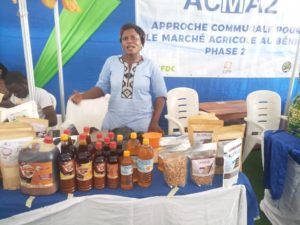 Nassirath Arobadade is engaged in the processing of palm nuts into three different types of palm oil: simple palm oil, zomi oil, and kernel oil. While she has been in the palm oil processing business for years, before training from ACMA2, she only produced basic palm oil for cooking and consumption. With assistance from ACMA, she learned how to produce the two other types of oil and improve the quality of her product. It was hard for her to get access to the market, but, ACMA2 also helped her find good markets, and even sell her product abroad. With the improved production and sales, she is now making more money than ever. “Before ACMA arrived, we had already established a women’s group named “IRE TI MBE”, but our work was not profitable because of the difficulties we faced. It was, for example, hard for us to take our products to the market because of the lack of a good means of transport, but ACMA provided tricycles and other useful tools to make the task easy for us. Today, we are often able to increase our incomes to 5,000,000 FCFA [about $8,500] when sales are good. ACMA also helped us to learn how to use networks in order to improve our sales. I am grateful for ACMA, because I know it’s taking care of us. We too are trying our best to value and honor its help in the field among our women’s teams. Thanks to ACMA program.”
Nassirath Arobadade is engaged in the processing of palm nuts into three different types of palm oil: simple palm oil, zomi oil, and kernel oil. While she has been in the palm oil processing business for years, before training from ACMA2, she only produced basic palm oil for cooking and consumption. With assistance from ACMA, she learned how to produce the two other types of oil and improve the quality of her product. It was hard for her to get access to the market, but, ACMA2 also helped her find good markets, and even sell her product abroad. With the improved production and sales, she is now making more money than ever. “Before ACMA arrived, we had already established a women’s group named “IRE TI MBE”, but our work was not profitable because of the difficulties we faced. It was, for example, hard for us to take our products to the market because of the lack of a good means of transport, but ACMA provided tricycles and other useful tools to make the task easy for us. Today, we are often able to increase our incomes to 5,000,000 FCFA [about $8,500] when sales are good. ACMA also helped us to learn how to use networks in order to improve our sales. I am grateful for ACMA, because I know it’s taking care of us. We too are trying our best to value and honor its help in the field among our women’s teams. Thanks to ACMA program.”
 Nadège Okpeitcha is an agronomist engineer and cassava processor. Since her childhood, she has had a strong passion for entrepreneurship. Right after completing her bachelors’ degree, she found an opportunity and engaged directly into cassava processing and sale of derived products. She confessed that her parents did not agree with her choice, because they wanted their daughter to become an office worker and pursue a career as an agronomist, not become a simple cassava processor. Nevertheless, they finally accepted their daughter’s decision when they saw how hard she worked and how well it paid off. “I thank ACMA and its team, for their goodness toward ABC actors. They helped me to have access to profitable markets and to show the world my products. I even sold all the stock I brought to the fair.“
Nadège Okpeitcha is an agronomist engineer and cassava processor. Since her childhood, she has had a strong passion for entrepreneurship. Right after completing her bachelors’ degree, she found an opportunity and engaged directly into cassava processing and sale of derived products. She confessed that her parents did not agree with her choice, because they wanted their daughter to become an office worker and pursue a career as an agronomist, not become a simple cassava processor. Nevertheless, they finally accepted their daughter’s decision when they saw how hard she worked and how well it paid off. “I thank ACMA and its team, for their goodness toward ABC actors. They helped me to have access to profitable markets and to show the world my products. I even sold all the stock I brought to the fair.“
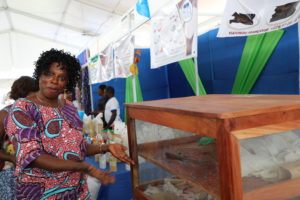 Françoise Viatonou is a fish smoker and has been engaged in this employment since her childhood. ACMA helped her improve her processing method. In the past, following hygiene standards during the process did not seem crucial to her, but, with the trainings received from ACMA program, she now knows and abides by hygienic standards. The knowledge acquired from these trainings gave her the idea to set up a team of twenty women doing the same activity. She manages the team, with the objective of ensuring that each member of the group masters the improved processing techniques and sales strategies provided by ACMA. She said that the husbands of the women of her team encourage and support the initiative, because most of them are fishermen. Previously, these women were unable to sell the fish their husbands caught. The idea of their wives’ team became a real opportunity for them to process their products before selling them; in this way, the women were able to actually sell their product because consumers preferred smoked fish over fresh. “ACMA has helped us a lot, and I also want to advise other producers helped by ACMA to ask for the advice of their market facilitators before entering into large sales contracts to far-off places. They can help ensure a solid transaction.”
Françoise Viatonou is a fish smoker and has been engaged in this employment since her childhood. ACMA helped her improve her processing method. In the past, following hygiene standards during the process did not seem crucial to her, but, with the trainings received from ACMA program, she now knows and abides by hygienic standards. The knowledge acquired from these trainings gave her the idea to set up a team of twenty women doing the same activity. She manages the team, with the objective of ensuring that each member of the group masters the improved processing techniques and sales strategies provided by ACMA. She said that the husbands of the women of her team encourage and support the initiative, because most of them are fishermen. Previously, these women were unable to sell the fish their husbands caught. The idea of their wives’ team became a real opportunity for them to process their products before selling them; in this way, the women were able to actually sell their product because consumers preferred smoked fish over fresh. “ACMA has helped us a lot, and I also want to advise other producers helped by ACMA to ask for the advice of their market facilitators before entering into large sales contracts to far-off places. They can help ensure a solid transaction.”
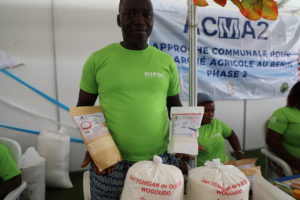
William Raoul has committed himself to the processing cassava into many types of gari. In the past, he was schoolteacher, but joined his mother in cassava processing and sale after a tragedy that nearly caused her death. When he realized that his mother’s business was more profitable than his teaching job, he immersed himself completely in the new endeavor. Nevertheless, he confessed that the arrival of ACMA program helped him to improve his production. “I’ve made agreements with thirty wholesale clients; I am thankful this has been made possible by. Customers have loved my product and its nice presentation. Thanks to ACMA.”
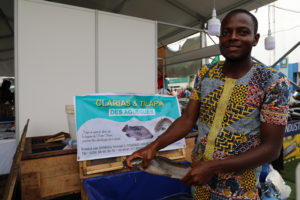 Michael Zannoun is a young fish farmer. Coming from Aguégués in the department of Ouémé, he inherited this business from his father, whom he had helped since his childhood. He realized that because fish consumption is continually increasing, the incomes of producers involved in that activity continually increased. As such, he decided to specialize in the fish farming business. “I came to the fair with thirty-five kilos of live fish, and I’ve sold all my stock. Last year, a large part of my was dead within 40 days because of the bad conservation. But this year ACMA helped me to practice better conservation. I am really grateful to ACMA for all it’s doing to lead us to success in our activities.
Michael Zannoun is a young fish farmer. Coming from Aguégués in the department of Ouémé, he inherited this business from his father, whom he had helped since his childhood. He realized that because fish consumption is continually increasing, the incomes of producers involved in that activity continually increased. As such, he decided to specialize in the fish farming business. “I came to the fair with thirty-five kilos of live fish, and I’ve sold all my stock. Last year, a large part of my was dead within 40 days because of the bad conservation. But this year ACMA helped me to practice better conservation. I am really grateful to ACMA for all it’s doing to lead us to success in our activities.
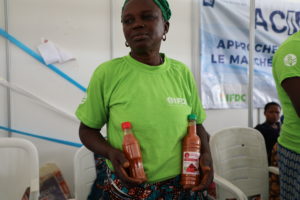
Céline Zannounkpevi is involved in the processing of pepper into chili powder. Previously, she was only growing cassava and maize. She admitted she was engaged in many areas to increase her standard of living, so when she learned from ACMA that pepper processing and trade is financially profitable too, she chose to explore that domain and to specialize herself in it if possible. For four years, she completely committed herself to the task and mastered the way to improve her product quality through ACMA member trainings. Questioned at the annual fair, at which she participated for the first time, she said, “I am grateful to the ACMA team for the fact that they helped me to come to the annual fair; this has been a great opportunity for me to show my products to more wholesalers than I could ever imagine. Many of them took my flyers and promised to call me back for profitable supplies.”



